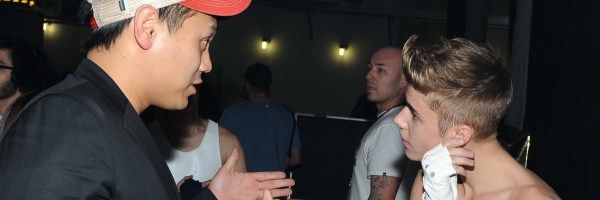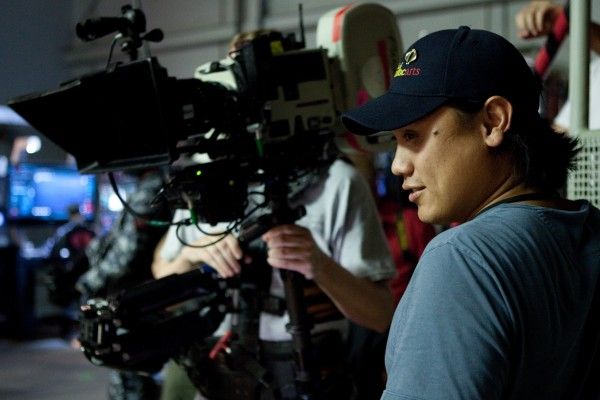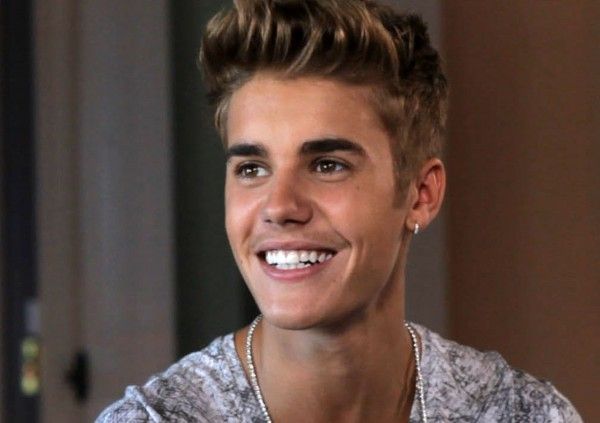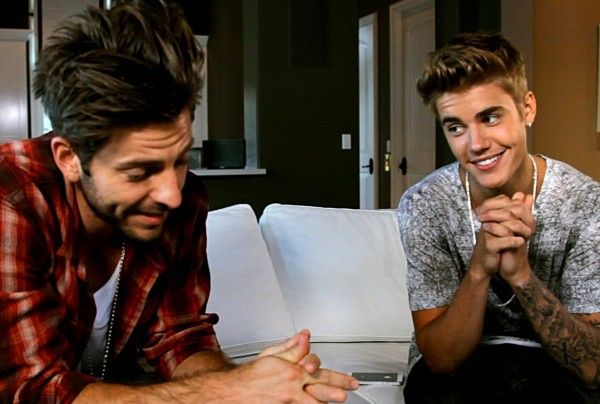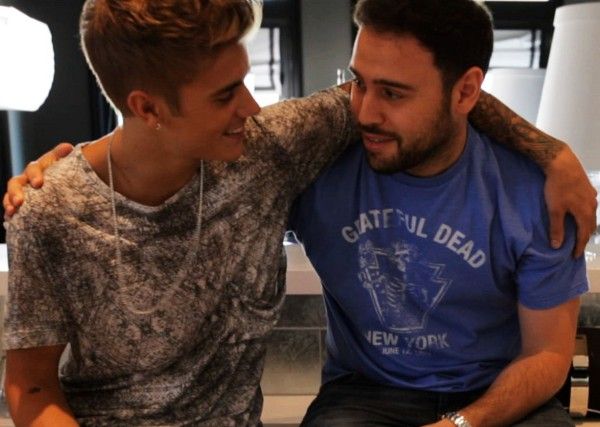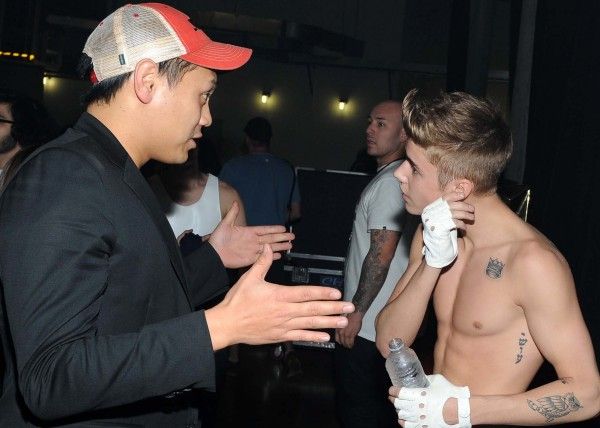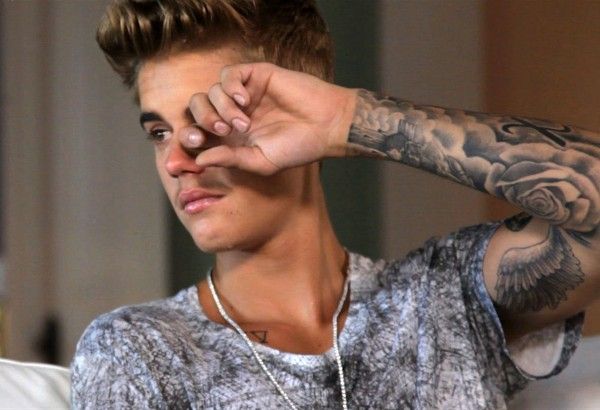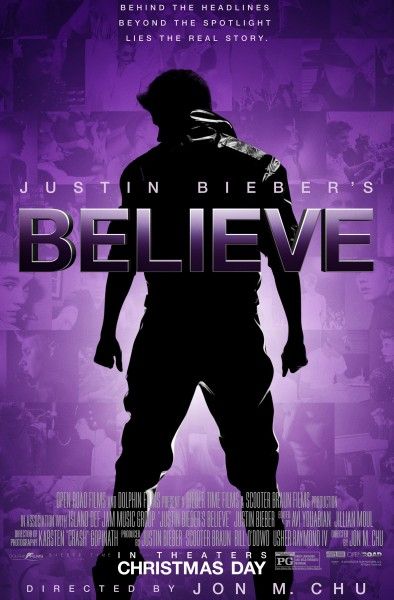Whether it’s the G.I. Joe films, the Step Up franchise, Justin Bieber documentaries or the web series The LXD, director Jon M. Chu brings a stunning visual style to all of his work. In the latest Justin Bieber documentary Believe, the 19-year-old is both unfiltered and brutally honest. Including brand new interviews with the pop star, the movie reveals long-awaited answers to questions about his passion to make music, relationships and coming of age in the spotlight, as well as never-before-seen concert footage and unprecedented behind-the-scenes access.
During this recent exclusive phone interview with Collider, filmmaker Jon M. Chu talked about what he wanted to achieve with this new Bieber documentary, how his motivation was to show the pop star as a human being, whether he thinks Bieber will ultimately take the right path, how being the creative director of a concert tour compares to directing films, where his creative inspiration came from, growing up, and how many more Bieber documentaries there could be. He also talked about what made him want to direct G.I. Joe 3, how they’re in the middle of designing and creating the world right now and writing the script, with a goal to start shooting in 2014, how he loves getting feedback and input from fans, what ultimately made him drop out of directing Masters of the Universe, and how he’d like to be able to direct two movies a year. Check out what he had to say after the jump.
Collider: Having already done one Justin Bieber film, with Never Say Never, what did you want to achieve with Believe? Had you always felt there was more story to tell?
JON M. CHU: Well, I knew there was more story to tell. I didn’t necessarily think it was now. When they asked me to do his life show, I agreed to it because I had never done a live show, in general, before then and I thought it was a fun opportunity. And when we started to do that, I said, “We should shoot the show and just release it as a concert movie. Let’s not do a documentary, the way we did Never Say Never. Let’s just do a concert movie. That will be fun.” So, that’s how the movie started. What we didn’t realize was that year we would be with him would be one of the most fascinating, crazy years of his life. It was hard because we were like, “Is this a real movie?” We struggled for the last seven or eight months over, “Is this a concert movie, or are we telling a story here?” We went back and forth until about mid-year, this year. We realized that he had come out of all that. When you’re going through that, you’re just in it, but he suddenly started to have perspective. I was like, “This is actually really interesting because he can talk about what this year was like and how this was a transition, and we can actually have a back-and-forth conversation about this.” I had seen a lot of the stuff that went done. I knew a lot of it wasn’t true, but I also knew he wasn’t as perfect as what he liked to claim to be. So, I thought it would be a fascinating look at a pop star, at this point in their career. That’s when we said, “We’re gonna go full-on, and actually let him talk and tell his story and do this.”
Are there music artists that you’ve had a similar emotional connection to, yourself, like the connection you see his fans have with him?
CHU: I always felt like that with Steve Jobs. I never knew Steve Jobs. I met him once, but I never knew him. But growing up in the Silicon Valley, he was the hero. He was the guy. He was the one that dropped out of college. He was the one where, when Apple was down, you were defending it like crazy. And it was the same thing with Michael Jackson. To me, those two, while I was growing up, were the ones. I was never crying and shaking like the Beliebers do, but I understand the idolizing of a hero.
With all of the paparazzi drama and the antics that have been going on recently, do you think that a film like this is important, to remind people of the music, and to show that Justin Bieber does have this career at 19?
CHU: My goal is not to defend Justin to show that he is a musician. That’s a part of it, but to be honest, my motivation is mostly to show that he’s a human being. I want to shot that he is not just this product that you can tear down and root to take down for your own entertainment. I do that, as well, to other stars, so it’s also a reminder to myself. I love pop culture. I love gossiping about all the different stars. But, the reality is that they’re people, as well. We shoot be rooting for these kids, especially when they’re 19, 18 and 17 years old, and they’re just starting their life. So, I wanted to show that music is the biggest part of his life. He loves his craft, more than anything else. Yeah, he’s doing these antics and messing up, here and there. He’s aware of it, but he’s also trying to get better. That is the human thing. He’s still a good kid, at the bottom of it. At 16 years old, he was becoming famous, but his maturity was growing slowly. We should help him figure those things out. So, I just wanted to show him as the human being that I know, to hopefully get people to see him as a real thing, and not just an object.
Once you reach a certain level of fame and stardom, people watch your every move and often wait for you to fail, which has to be hard on any teenager. Was it important to you that he take responsibility for his behavior, and acknowledge some of his mistakes?
CHU: Yeah. I knew he had felt that, so I wanted to get it on film. I had many conversations before the actual filmed interview with him, just as a friend. With the things that were going on, a lot of it wasn’t true. A lot of it was just misunderstandings, and a lot of it was things that he kind of did, but that got blown out of proportion. I think the fact that he let me ask the tough questions, and he lets people say, “You know that, most likely, you’re going to be a train wreck. You know that history is against you. One day, you’re going to look back at this and you’re either gonna be proud that you survived this, or you’re going to be ashamed that you fell to the things that you say you’re not going to.” I don’t know if he had ever thought about it before. He said he’d thought about it before, and that he and his friends talk about it, all the time. But, I could see his mind still processing it. We don’t say it out loud, but you can see his mind working and you can understand that he hasn’t figured it all out yet. He’s still a kid, but he’s trying to. That’s what we should be rooting for. We should be rooting for him to figure it out, the right way.
Having gotten to know him as well as you have, do you see him ultimately getting his head together and going down the right path, or do you think the verdict is still out on that?
CHU: I think he’s a really good person. The reality of him believing in the idea of helping others, and kids, especially, like his young fans, is completely genuine and super real. He might not treat someone he just meets the warmest, but then, when he turns and sees a kid, he will look them in the eye and be the nicest and warmest to them. There’s something about the innocence of a kid not wanting something from him that he really appreciates. So, I really do have faith that he’ll be fine. But when I talk to him, it’s completely in his hands. He knows that the choices are right in front of him. In a way, we made this movie to show him. In a way, I made this movie to say, “Look at your life, right now. We’re putting a yard stick in your life, right now. Look how great you have it. You have people who support you, who love you, and who want the best for you, and here’s you saying that you want the best for you, as well.” This is a letter to him to hang his hat on, when he actually confronts the decisions that are coming in the next two years, that are going to make him the man that he will become.
How did being the creative director of a music tour compare to directing a film?
CHU: It was completely crazy! I loved the energy. You create all this stuff around the star up on the stage, and yet you have no control because once they’re on that stage, if they feel something, they’re gonna go do it. If the audience feels something, they’re gonna react in a different way. Everything has to shift. You almost have to make this ship that goes with the wave, and can react to those waves in the best possible way, rather than just making a piece of art that exists on its own and that you look at. So, I loved that energy. It was very stressful, don’t get me wrong. Everything you want to change, it isn’t you in the edit room, trying to shift a frame, here and there. You’ve gotta change the band and the lighting cue and the screen cue, and then you’ve gotta tell Justin. If Justin doesn’t hear it and he’s off by a beat, then everything is off by a beat. That was very complicated, but I loved it. It was like designing a Disneyland ride. I thought it was really fun.
What’s it like to audition all of the dancers, and then choose whose dreams you’ll make come true and whose hearts you’ll crush? Is it difficult to make those cuts and decisions?
CHU: Yeah, and I’ve worked with dancers before, so I know how that goes. What always gives me peace of mind is that the best are the best. People who float to the top will always float to the top. You may miss them in this audition, but in the next audition, they’ll float to the top. And there are different jobs. Someone that I work with all the time may be awesome, but they’re just not right for the Justin Bieber Believe tour. So, what keeps me motivated is that I’m going to do a bunch of projects with dancers, and the people who compel me and make me love dance again are the ones I want to hire because they’ll do that for others who are watching the thing. So yeah, it is difficult to crush dream sometimes, but they’re all professional and they know what the deal is.
When he decided to direct his first music video, was there any advice that you gave him, or were you surprised at how easily he took to it?
CHU: I was worried because there wasn’t a lot of prep time. I had to prep a lot of it, to make sure everything was set. But when he got there, I gave him the camera and said, “You’re shooting this yourself.” He was like, “Okay, so you’re going to hold it?,” and I was like, “No, you’re holding it in your hand.” And he was like, “Is the quality going to be good enough?” I was like, “We did a test and it looked great.” We had talked about the concept, over and over again, but for the first hour, he was very scared about holding the camera. After that, he took control and was telling people where to go and where the dancers needed to be. We’d be like, “Okay, I think we’ve got it,” and he’d be like, “No, we’re doing it again.” I loved seeing that because that’s the job I love. That’s the job I’m going to do for the rest of my life. So, I love that he got the bug while filming it.
You certainly have a talent for bringing big visual concepts to life, in a very relatable way. How do you think that approach has helped you give the world of dance and music a life that it hasn’t really had before on film?
CHU: I’ve never really thought about it. The thing that keeps me interested is that I love stories. I love going to movies and I love watching stuff that sparks ideas in my brain. I’m not the most sophisticated person. I’m not the smartest person in the world. But, I know what makes me excited about life, from Spielberg movies to Michael Jackson music videos to cartoons on Saturday mornings, which made my childhood. In all my work, I try to tell great stories that people want to go to the movie theater to watch, or want to turn on, and are compelled to watch it, over and over and over again, and will make a mark when they grow up.
After the delays and everything you went through to finally get G.I. Joe: Retaliation in theaters, what made you want to stick around for G.I. Joe 3?
CHU: Well, this was sort of a vacation for that, to be honest. It started as, “Oh, gosh, I have to go do the dimensionalization for Joe, and sit in a dark room and watch people kill each other.” This was fun escape. I was like, “It’s easy. We’re just gonna do a concert film. It’s not gonna be a big deal.” But as we did it, it just grew and grew and grew. It was nice to jump back into something that’s a genre that we innovated, putting documentary and music together in a more organic way. We wanted to take it to the next level and mature it a beat, so we thought it was a good opportunity to do that.
Did that break from G.I. Joe allow you to come back for the third film with a fresh eye that you wouldn’t have had before?
CHU: For sure! It was more mental therapy, then anything else. When you’re stuck in a movie for two or three years, it’s all you think about and the movie becomes shit because you just have no context. You’re just swimming in your own shit. So, at a certain point, when you actually get to escape, it allows you to see it differently. I definitely came back with more energy. I definitely came back going, “Okay, now it’s clear. This is how we got those kids to scream here and to laugh.” To get that back into Joe was a relief.
Do you have any idea when you’re going to start shooting?
CHU: I think we’re going to shoot this coming year. We’ve been designing a bunch of stuff. I don’t know if I’m fully allowed to say when or how we’re gonna do it, but we’re in the middle of designing and creating the world right now, and writing the script. It’s going to be quite the adventure.
With as vocal as fans are on social media, what are you hearing about what they want to see in the next installment and are you taking any of that into account?
CHU: Yes and no. I love hearing it. That was never possible before. I work from the vantage of the information that we have and the characters that I may have forgotten about that people really love. A lot of it is just to confirm the things that I think are what make Joe. But, we’re never dictated by that. Movies are for a bigger audience than just the fans of that certain genre or that certain IP. But, I definitely love to hear it because it is a collaborative effort. When I’m doing something, it’s something that I had a perspective on in my childhood, or now, but it may be different. I always can go back to what I love, but if somebody has a better idea, then I’m all for it.
When you take on a property like that, that so many people are familiar with, and then you go back to it again, people expect you to top what you did the last time. For you, is it about making the action bigger, better and more exciting, or is it more about taking things in an entirely new and fresh direction?
CHU: It’s definitely not about making it bigger ‘cause we went pretty big last time and it didn’t necessarily make it better. Same thing with dance. When we do dance stuff that has big tricks, those big tricks are great in moderation. When you have a nice valley, you can have a hill of something awesome. But in terms of Joe, I think it’s more about being creative with it and giving the audience something different and new. We’ve had two G.I. Joes now, in two very different ways, and we have to take the lessons that we learned with those two to try to make the best Joe possible. I love G.I. Joe because it’s about heroes. It’s very classic storytelling. There are villains and there are heroes, and there are human beings in the middle of it all, and they have to make choices about their life to become the hero. They have to sacrifice, they have to risk themselves, and they’re fighting for something. I love that it has classic storytelling. I always try to bring that back and try to make it simpler. It doesn’t have to be big, but you have to have more creative fighting and simpler storytelling, so you can enjoy it.
Because of what you did with G.I. Joe, people were very excited about you taking on Masters of the Universe. What was it that ultimately led you to part ways with that? Was it creative differences, or was it just the timing not working out?
CHU: It was timing. We did so much for Masters, and the script is awesome. I love that project. I would have loved to do it. The problem with Joe is that we have a specific timeline and I need to be on that timeline. Masters wasn’t ready to go, at that moment. And I have a loyalty to G.I. Joe. I don’t feel like I’ve fulfilled the promise I gave, to bring everything I love about Joe to the script. I feel like we did a lot of foundational stuff. We cleared the way. We brought the movie back to life, but at the same time, there’s so much more to do, to make it even better. I learned a lot on the last one, and I want to put that into practice and make this one even better, and make it have life for many, many movies in the future, whether I’m doing them or not.
That’s cool because it’s not everyday that you get an opportunity, as a filmmaker, to be able to expand on the foundation you’ve already laid down.
CHU: It’s pretty strange. By the time I finish G.I. Joe, I will have done the sequel every single one of my movies. I did Step Up 2 and Step Up 3, Never Say Never and Believe, and G.I. Joe 2 and 3. That’s a weird thing to have, but in a weird way, I still see this as my grad school and I’m learning every time I do it. How great that I get the opportunity to do another movie, when the first one does well.
Do you see yourself doing a third Justin Bieber documentary?
CHU: I don’t know. What I love about the position that I’m in is that I’ve grown to know him. I’ve seen him when he was a boy, and I’ve seen him as a man. I think the next step is actually really interesting. But, who knows how our relationship will grow. I don’t know what he’s going to turn into, in the future. There are so many unknowns. But, I would love the opportunity to continue to tell his whole life and really get a glimpse of a pop star, from the beginning to the end. I think that would be really, really cool.
You’re also producing action-horror film Run. What was it about that project that appealed to you and made you want to get involved, but not take the helm of it?
CHU: The time between Joe 2 and Joe 3, I’ve had a little bit of time to set things up, and I haven’t had that since my first movie. I had a lot of ideas, so we’re actually setting up a bunch of movies, all around town, that we’ll announce in time. This was just one of the first ones, and it’s just a really fun one. I know so many writers and creative collaborators that I can take some of the ideas we’ve come up with and actually go set them up at studios, whether I’m directing them or not. It’s been really fun to start building that part of the business.
Is Matched something you’re still looking to direct, at some point?
CHU: No. Once I took the Joe stuff, it cleared my slate a bit. So, I’m no longer doing Matched.
Are you already thinking ahead to where you want to go after G.I. Joe 3?
CHU: The one you’d never expect me to do is the one I want to do, after that. Whether it’s a horror film or a romantic comedy or a small little drama, I think that would be really, really fun. Making two movies in a year, this year, was really fun. I would love to do more years like that. It was insane, and they’re very different movies, but it almost de-stresses me when I’m doing more than one movie because it makes one not the end of the world. It makes me feel like, “Okay, I won. I had a victory on this one, today. And I lost on this one, today.” I can keep going back-and-forth. I love the process of working with people and having things going on, all the time, and just trying to trust your instincts.
So, you’re open to any genre of film?
CHU: Yeah. When I was in Boy Scouts, back in the day, we’d tell stories around the campfire. That’s why I love movies. It’s literally you and your friends, telling stories around a campfire, whatever they may be. I always want to make movies like that. And maybe my tastes will change. Maybe all of my movies will have some sort of specific message that I want to tell, eventually. But right now, I love the adventure of telling all types of stories and trying to conquer each one.
Believe opens in theaters on December 25th.

